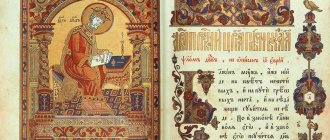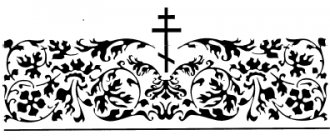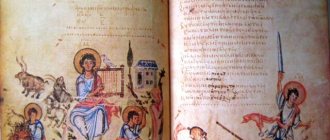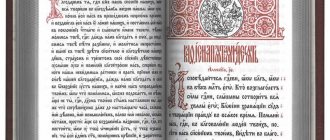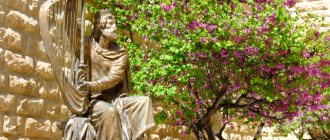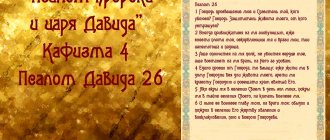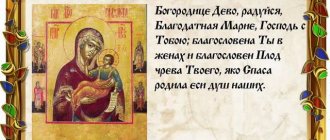What is the Indestructible Psalter
The Psalter is the sacred book of the Old Testament and New Testament religion. It is used for various services and for home cleansing of the soul and body. Prayer texts from the Psalter save from diseases if they have affected the body or spirit of a person. Prayer is aimed at correcting problems inside and outside.
Story
The Psalms were written over many years. They were used to repose the dead and bid them farewell. Over the years, the Psalter began to be practiced not only in repose, but also in attracting health.
The author of the book was the prophet and sage David. After his death, the Psalter was written and supplemented many times. The result of the labors of believers was a unique collection for various purposes.
The meaning of the holy book
Psalms are read at many services. They are used as a source of valuable information for believers. Reading prayers from the collection every day gives peace and peace of mind. In such tranquility a person finds himself and his path to God. The Psalter for Health is used in case of trouble or to maintain health. It is suitable for reading by children or adults.
The Psalter consists of psalms, they are used in whole or in part - they are divided into separate prokemenas. They are used in worship as preliminary preparation. Psalms are read separately or as part of a general appeal to the Lord, and are often used in chants. Their versatility and effectiveness created all the prerequisites for such popularity among believers.
The Psalter is called the Revelation of life. The book describes the most significant things, actions, thoughts, helps you understand yourself, understand yourself and the world around you. Every day, reading the Psalter changes your worldview. The collection predicts the future and helps to extract valuable advice from the past.
The Psalter has universal significance. The Holy Book does not mislead, but carefully guides. For beginners, individual psalms will be difficult to understand, especially at first. The book requires study, patience and respect for its wisdom. Only persistent people are able to understand all its hidden sacred meaning.
Use of the Psalter
Psalms, as sacred songs, were mostly written for temple worship in ancient Israel. Each psalm has its own story, its own special reason for writing. In the Christian church, the Psalter has also become the main book of worship; believers sing and pray in a new way by reading the psalms, seeing in them an indication of the love of God revealed through Jesus Christ. Church experience determines for many psalms a special prayer purpose, in particular psalms read during illness.
Preparation for prayer
The Psalter is not just a holy book. It contains Divine hymns. The very title of the collection reveals its meaning. The hymn is an inviolable truth, it helps and allows you to understand the truth. Every prayer is a path to God and to yourself.
By reading a book, a person calls Angels to him. Why is it so important to read it when the soul feels bad and when it feels good:
- a person's sins are atoned for;
- he gets a chance to calm down and finds harmony;
- anxiety decreases;
- negative thoughts disappear;
- a person gains faith in the best, no matter what happens to him in the present moment.
The Psalter nourishes the soul, charges it, connects it with the Holy Spirit. Even a suffering soul is not left alone. She receives support, she gets a unique opportunity to say goodbye to trouble and choose the path of spiritual liberation.
Preparation for reading the psalms consists of several stages: first the body and soul are cleansed, then special prayer texts are read - they prepare for reading the Psalter. Such preparation allows you to approach this peculiar ritual consciously and without haste. When the soul is cleansed, it does not require the bustle of the surrounding world. She is free from everything that worried her a few minutes ago.
Cleansing the soul and body
According to legends, prayer, like the psalms, has a longer history than the Jesus Prayer or reading akathists. Before the prayer of Jesus appeared, the monks silently repeated the Psalter. The unique story of the prayer book is wisdom, and not every person is able to accept it.
Cleansing your soul and body every day for several reasons.
- Reading a prayer requires a certain concentration. A person has no right to begin turning to God without preparation. He collected negativity during the day, other people’s negative thoughts. If a person is angry or anxious, he is unable to absorb new information. It's closed.
- Cleansing the body is of particular importance. On a subconscious level, a person feels how he is freed from dirt. He cleanses himself, allows his body to say goodbye to the burden of the past day. By cleansing the body, your mood improves and your soul becomes lighter.
- Cleansing the soul involves giving up everything that was collected during the day. A person says goodbye to fears, anxieties and worries. He accepts that not everything went smoothly, but he is willing to learn from his mistakes.
- Reading prayer texts is faster and more effective if you use preliminary preparation. A person gives a signal to his mind that he will soon turn to God. He opens up, he is ready to listen and accept.
In peace of mind lies another task - the willingness to accept help. Prayers for health are aimed at treatment. Diseases are a reflection of the internal state. If a person feels a loss of strength, he feels bad or hard, he is spiritually weakened. Cleansing the soul leads to recovery.
Reading additional prayers
Orthodox ascetic practice is very diverse - it allows for preparation before the main prayer. In most cases, it includes reading special texts. They put a person in the right mood and give him time to calm down.
For health and liberation from illness, the following preparatory prayers are used:
After reading the first prayer for the return of health, without interruption, the person reads the second kathisma:
Where the kathisma is interrupted by the mark “Glory”, the following prayers are read:
At the end of it, the praying person bows. The more effort on the part of the believer, the greater the power in the prayer itself. The first two parts of the preparatory prayer mention the names of those who need health promotion. The third prayer mentions the names of those who need to calm down, find peace and harmony within themselves.
Third part of the preparatory prayer:
A list of names is inserted in the middle of the prayer. It is prepared in advance. At the end there are bows. The final part of the prayers, as preparation for turning to the main book for the Orthodox, consists of a simple phrase:
Now the person is ready to read the psalms. He continues reading the prayer words in the same order and at the same pace. After the last prayer, troparia or additional texts are used if a person feels any traces of anxiety or self-doubt.
A universal method of calming down is reading “Lord, have mercy” exactly 40 times. A rosary or fingers are used to concentrate attention. In some cases, when a believer expresses such a desire, in the middle of 40 repetitions of “Lord, have mercy,” the person inserts a personal prayer. All relatives and loved ones are mentioned in it. They need protection and the person praying asks for it.
LiveInternetLiveInternet
Tuesday, June 16, 2015 10:28 + to quote book
Psychology, we and.. Psalms!
Healing diseases and the Psalter of King David - the point of view of a psychologist
For many centuries in a row, one of the most famous sections of the Bible - the Davidic Psalter (or “Psalms of David”) has been a favorite reading for thousands of people of different nationalities and religions, from generation to generation.
Even atheists read psalms!
People who are somehow involved in the cultural practice of reading the Bible draw from this small book, the Psalter, strength and wisdom to comprehend:
- the vicissitudes of your fate,
- “surprises” in interpersonal relationships,
- and for the best self-maintenance - in almost any acute, difficult life situation, especially related to health.
So, in illness, in a loud conflict with people, or simply in a stream of inexplicable hardships - the Psalms “read” our life “as if from an open book”...
It is strange that human life has not changed in several thousand years. Whether we are talking about the “capital” king or the last provincial official...
Psychology, us and the Psalms
Indeed, if the knights of the psychology of interpersonal relationships (social psychologists) more often recommended for nervous breakdowns - not drug therapy (through their psychiatrist accomplices), but... reading psalms - the world would breathe a sigh of relief, and people would stop walking the streets (more precisely, crawl) gloomy, frightened people, locked in their own hell.
But you can’t force someone to go to heaven. All collective forced marches of peoples to heaven always ended in hell or a circus. Therefore, everyone opens the Door only for themselves, and then only when it is opened for them.
Psalms for healing illnesses
We get sick when the body can no longer shout to us in any other way that we have been acting to the detriment of both ourselves and the universe for a long time. We are too slow in our past or too rushing into the future at the wrong address.
It’s easy to say: “Well, live right, are you really that stupid!”
If it were SO easy to do, read a couple of smart books “with your eyes” and become wiser, no one would get sick - nothing. Even a respiratory infection. Especially the professors. They are the smartest, they know everything.
But in terms of health, professors are most often pitiful ruins, so it’s not a matter of intelligence. And not in reading “with the eyes.”
Therefore, we will not become clever, but will get straight to the point.
In the Jewish tradition there is a special selection from the psalms of David - for reading aloud during a serious illness, sorrow or grief - personal, family or collective disaster.
A crisis can lead a Personality either to final collapse (even to premature death for the complete absence of reasons!), or... the person grows wings.
The Psalms are read in times of crisis like this, in order to prevent precisely that—collapse. So that the test becomes good. Actually, psychotherapists teach this to their clients, but they teach it poorly.
So, below I present for you, friends, a list of David's psalms that need to be read aloud, completely, from beginning to end. Psalms healing illness and despair.
The list of these psalms is given in the so-called “Russian numbering”. That is, according to the Bible in the Russian Synodal Translation.
Psalm numbers:
19, 6, 9, 12, 17, 21, 22, 24, 29, 30, 31, 32, 35, 36, 37, 38, 40, 48, 54, 55, 68, 85, 87, 88, 89, 90, 101, 102, 103, 106, 114, 117, 141, 142, 127.
Important rules when reading psalms:
- Don’t read the psalms with your eyes, read with your heart. That is, try to ensure that your reading approaches the concept of “liturgical reading” and moves away from the superficial and meaningless – “secular reading”;
- Which means: do not read the psalms unless absolutely necessary, for the sake of nonsense “cultural acquaintance”;
- Read the psalms, even if necessary, only out loud.
PS The Jewish numbering of the same psalms has different numbers, but... reading (singing) Tehillim is another story.
Elena Nazarenko
source
The Mystery of David's Psalms
About the Psalms of David and how they are used by elders and people in life situations.
Let us note that King David left people a truly valuable legacy, which we will continue to comprehend and comprehend.
1 Psalm. Reading this Psalm will bring fruit and harvest. Especially when you are just putting something into the ground - a seed or a root.
2 Psalm. Open your inner vision, get good advice.
3 Psalm. Remove human envy and anger.
4 Psalm. Heal the soft-hearted, give confidence to a person. Move away the state of despondency at the sight of the deeds of the hard-hearted.
5 Psalm. Healing the eyes. Get rid of the evil eye.
6 Psalm. Free yourself from the spell.
7 Psalm. Read tormented by fear from the intrigues and threats of villains.
8 Psalm. Useful for those wounded by demons or wicked people.
Psalm 9 Stop demonic fears in your sleep or temptations during the day.
10 Psalm. Let hard-hearted spouses who bicker and divorce (when a hard-hearted husband or wife torments their spouse) pay attention to this Psalm.
11 Psalm. It will help the mentally ill who are tormented by anger and attack their neighbors. Relieves mental illnesses and conditions.
12 Psalm. Heals liver diseases.
13 Psalm. Read this Psalm from the demon and devilish entities three times a day for three days in a row.
14 Psalm. Protect yourself from thieves. Find the thief or criminal. Convert them to repentance.
15 Psalm. Find the lost key.
16 Psalm. In case of serious unfair accusations, read three times a day for three days in a row.
17 Psalm. Read without stopping during earthquakes, other disasters or thunderstorms.
Psalm 18 Useful for women in labor before childbirth. It's easy to give birth.
Psalm 19 Will help infertile spouses. Healing infertility. Keep the family intact and not get divorced.
Psalm 20 Softening the hearts of the rich and greedy.
Psalm 21 From fire, avoid damage.
Psalm 22 He will pacify disobedient and disobedient children so that they do not upset their parents. Show parents their mistakes in raising their children.
Psalm 23 Find a way to open the door when the key is lost. A way out of difficult everyday situations.
Psalm 24 Those who suffer greatly from temptations that lose and complain. Find your way.
Psalm 25 When someone asks God for something, so that He can grant it without harming the person asking. Bad requests will be returned to the requester.
26 Psalm. Protect yourself from the enemy. Save people and fields.
Psalm 27 Ask the Lord for healing for those suffering from mental and nervous illnesses.
Psalm 28 Useful for those suffering from seasickness and those afraid of rough seas. Read before a sea voyage, before going to the sea.
Psalm 29 Let other people know God.
Psalm 30 Pray with the intention: “May the Lord provide sufficient grain and fruit when the weather is unfavorable for farming.”
Psalm 31 Find the way.
Psalm 32 Pray with the request: “May the Lord reveal the truth about those unjustly convicted and may they be released.”
Psalm 33 Read to those who are on the verge of death, when they are tormented by demons. Or when the enemy invades with sinister intentions. Get rid of enemies.
Psalm 34 To free good people from the snares of the evil ones that oppress people who believe in God.
Psalm 35 Dispel hostility after arguments and misunderstandings.
Psalm 36 Wounded and offended by criminals.
Psalm 37 For toothache.
Psalm 38 Find a job. Have permanent and additional income.
Psalm 39 Reconcile the owner (boss) and the employee after a quarrel.
Psalm 40 Read with the request: “May the wife be delivered successfully if the birth is premature.”
Psalm 41 Young people when they suffer from unhappy love. Add feelings and passion.
Psalm 42 Release from captivity. Resolving problem situations.
Psalm 43 This Psalm will reveal the truth to the spouses if there was a misunderstanding between them, so that they can live in peace and love.
Psalm 44 Suffering from heart or kidney disease. Healing. Setting up for spiritual life.
Psalm 45 Young people who are not allowed to marry by their enemies out of envy. Get rid of enemies.
Psalm 46 Reconciliation between employee and boss. Good luck finding a job. Before and after meeting with future employers.
Psalm 47 Protects against criminals and robbers. Read for 40 days.
Psalm 48 Those whose work is fraught with danger. Before work and after work.
Psalm 49 Let those who have wandered away from God repent and turn, that they may be saved.
Psalm 50 When, for our sins, God sends punishment (a pestilence of people or animals) to admonish us. Protect yourself from Divine wrath.
Psalm 51 With a request that the hard-hearted rulers repent. Let their hearts be softened, and let them stop tormenting the people. A relevant Psalm for today.
Psalm 52 For successful fishing. Attracting material benefits.
Psalm 53 Read so that the boss will have mercy on his subordinate. Remove bosses' nagging.
Psalm 54 Pray with the request: “May the good name of the family that was unjustly accused be restored.”
Psalm 55 For soft-hearted people who are hurt by their neighbors.
Psalm 56 Those suffering from headaches resulting from the great tribulation. Clearing karma.
Psalm 57 Favorable circumstances for workers with good intentions. Prohibition to demons and evil people.
Psalm 58 Mute - gift of speech. Deaf people have the gift of hearing.
Psalm 59 Pray with the request: “May the Lord reveal the truth when many people are condemned unrighteously.”
Psalm 60 For those who find it difficult to work out of laziness or fear.
Psalm 61 May the Lord deliver the weak from adversity so that he does not complain. Give strength.
Psalm 62 Let the fields and trees bear fruit during the drought.
Psalm 63 When bitten by a rabid dog. Protection from wolves.
Psalm 64 Prosperity of trade.
Psalm 65 May the evil one not bring discord into the house, and may not plunge the family into sorrow.
Psalm 66 Blessing on livestock.
Psalm 67 Healing those suffering from miscarriages.
Psalm 68 When the rivers overflow from the rains and wash away people and houses.
Psalm 69 To the soft-hearted, who become sad and despair over trifles, may the Lord strengthen them. Self confidence.
Psalm 70 Healing from loneliness.
Psalm 71 Blessing of the new harvest.
Psalm 72 Bring criminals to repentance.
Psalm 73 Protection of peasants who work in the fields.
Psalm 74 May the evil owner reconcile and not torment his neighbors and workers.
Psalm 75 A mother who is afraid during childbirth.
Psalm 76 When there is no mutual understanding and love between parents and children.
Psalm 77 May the Lord enlighten creditors so that they will be compassionate and not extort debts from debtors.
Psalm 78 Protection from thieves.
Psalm 79 Healing a patient with dropsy.
Psalm 80 May the Lord not leave the poor in need and grief, those who have fallen into despair from poverty. Ask for prosperity in business.
Psalm 81 For good trading.
Psalm 82 May God forbid the villains who are planning to kill.
Psalm 83 Protect household utensils, livestock and fruits of labor.
Psalm 84 Healing those suffering from fright.
Psalm 85 May God save the world when plague and disease comes and people die.
Psalm 86 May the Lord prolong the lives of those family members whom others cannot do without.
Psalm 87 May the Lord protect the defenseless who suffer from their hard-hearted neighbors.
Psalm 88 May the Lord strengthen the sick and weak, so that they do not become exhausted at work and do not fall into despondency.
Psalm 89 Asking for rain in a drought.
Psalm 90 Prayer with the request: “May the demon that appears before a person and frightens him disappear.” Protection from the evil eye and damage.
Psalm 91 Gives people prudence so that they grow spiritually.
Psalm 92 Protecting a ship in danger at sea.
Psalm 93 May the Lord enlighten the troublemakers who sow discord among the people and cause unrest and division.
Psalm 94 May spouses not fall under the influence of spells that make them quarrel and bicker.
Psalm 95 Healing from deafness.
Psalm 96 Dispel the spell.
Psalm 97 Comfort those saddened by grief.
Psalm 98 God bless the young who want to leave everything and follow Him, and may He give them grace.
Psalm 99 May the Lord bless those who do His will and fulfill their desires.
100 Psalm. Give gifts and talents to kind and simple-hearted people.
Psalm 101 May God bless those in power to be kind and compassionate and to help people.
102 Psalm. Help for a woman suffering from female infirmities.
Psalm 103 May the Lord bless the wealth of people, so that they do not fall into despondency, but glorify God.
104 Psalm. Repentance and confession of sins.
105 Psalm. May the Lord enlighten people so that they do not deviate from the path of salvation.
106 Psalm. Healing the infertile.
107 Psalm. Subdue the enemies and let them abandon their evil intentions.
108 Psalm. Protection from false accusers.
Psalm 109 So that the younger ones respect the elders.
Psalm 110 May unrighteous judges repent and judge the people of God with justice.
Psalm 111 May the Lord protect soldiers going to military service or war.
112 Psalm. Blessing of the widow.
Psalm 113 Healing weak-minded children.
114 Psalm. Blessing poor children and comforting them. Fulfillment of their desires.
115 Psalm. Healing from the passion of lies.
116 Psalm. Keep love in the family.
117 Psalm. Protection from criminals and thieves.
118 Psalm. Protecting innocent women and children from enemies.
119 Psalm. A request for long-suffering for those who have to live with the evil and unrighteous.
Psalm 120 Blessing the poor people and those who work hard for little money.
Psalm 121 Healing those suffering from superstition.
122 Psalm. Healing the blind and those suffering from eye diseases.
123 Psalm. Protect people from snakes so they don't bite.
124 Psalm. May the Lord protect the fields of the righteous from evil people, from thieves and envious people.
125 Psalm. Healing those suffering from headaches.
126 Psalm. Peace in the family. Peace after a quarrel.
127 Psalm. May God's peace and blessing be in the family.
128 Psalm. Healing migraine sufferers.
129 Psalm. For those starting a new job.
Psalm 130 Confess.
Psalm 131 World. Ending the war.
132 Psalm. Prayer with the request: “May the Lord enlighten the nations, so that they become peace-loving and live in peace.”
133 Psalm. This Psalm will protect from any misfortune.
134 Psalm. Concentrate people during prayer and may their souls unite with God.
135 Psalm. Protecting refugees when they leave their homes and go away.
136 Psalm. Calm the hot-tempered.
137 Psalm. So that rulers understand the needs of the people.
138 Psalm. Delivering the weak in spirit from the temptations of blasphemous thoughts.
139 Psalm. Pacifying the difficult character of the head of the family, so that the family does not suffer from him.
140 Psalm. May the Lord pacify the cruel ruler who torments his neighbors.
Psalm 141 May the Lord pacify the troublemaker who brings grief to people.
142 Psalm. Protection of a pregnant woman. Read so as not to lose the fruit.
143 Psalm. Avoiding popular uprising and riot.
144 Psalm. May God bless the efforts of people and accept them.
145 Psalm. Healing those suffering from bleeding.
146 Psalm. Healing from the grievances and traumas of criminals.
147 Psalm. Taming wild animals.
148 Psalm. Prayer for favorable weather and a rich harvest.
149 Psalm. In gratitude to God for His many mercies and for the abundance of His love, which knows no bounds and abides with us.
150 Psalm. May the Lord send contentment and consolation to our brothers and sisters in distant lands, and to our deceased brothers and sisters, who are even further away from us. Amen.
Complete Psalms of David
via this
link
Describing all these Psalms, I referred to the interpretations of the Venerable Elder Arseny and Father Paisius from Athos.
To truly tune in to the mystery of the Psalter and feed on that wonderful energy, you need to read the Psalms daily for 4 hours in a row without stopping. I repeat again: pray not for 1-2-3 days, but pray for a year and two years every day, but do not expect miracles. Then all your desires will come true, and problems and adversities will bypass you.
Turn off commercialism and the state of “consumerism”. Start doing something yourself first. Feel intuitively each Psalm to suit your needs.
source
| Categories: | 3 Life wisdom/practical advice |
Tags:
psalms David healing
Cited 94 times Liked by: 34 users
Like share
0
Like
- 34
I liked the post - Quoted
- 2
Saved
- Add to quote book
- 2
Save to links
Liked34
0
Reading by agreement
In Orthodoxy there is a separate rule for reading the Psalter. Due to its large size, it is possible to read prayer words together. People get together and at the same time reread psalms for illness and any health problem. This procedure is called reading by agreement. It is effective, as is reading the prayer words yourself.
A group of believers gathers to read together. People agree to comply with the conditions of such a reading and sincerely believe in every word spoken.
Participants agree to read the entire Psalter one by one—they manage to read the entire book in 24 hours. Each believer is assigned one psalm. He reads it at home, in complete solitude.
Kathismas are read at home, but the names of everyone included in the joint reading group are mentioned in them. The next day the church ritual is repeated. Believers again read the Psalter from beginning to end.
If a person from the group failed to read the kathisma assigned to him, it is read the next day - 2 times instead of once. If a believer reads a prayer, the next day he begins to read the next text in order about healing the soul and body.
The practice is used during Lent. The Psalter is read for 40 days in a row. Using this technique, prayers for health gain incredible power. They are strengthened by the thoughts of a dozen believers at the same time. It is very difficult for one person to perform such a ritual on his own. Incessant prayer from the lips of different people remains effective and powerful.
Orthodox Life
Interpretation of the 6th Psalm. 10 lines that change your life.
Psalm 6 is the Book of Job in miniature; it teaches us the correct attitude towards suffering.
Job, a wealthy man of righteous life, highly respected, “more famous than all the sons of the East,” suddenly loses in a matter of hours all his enormous property, ten children who died during a feast under the ruins, and his health.
Suffering unbearably physically and morally, he seeks support and consolation from his loved ones, but, alas, finds no help either in the person of his wife, who left him, advising him to “blaspheme God and die,” or in his friends, who denounced him and shamed him instead of words of consolation. .
For a moment, Job decided that God Himself had turned away from him, had forgotten about his existence, his suffering, and was deaf to his pleas. He did not understand why such grief befell him: he was an immaculate, just and God-fearing man, he shunned evil. What is his fault, what has he done wrong before God?!
What reason does Job have for being offended for undeserved suffering...
The lines of Psalm 6 seem to echo Job’s suffering lamentations:
"God! Do not rebuke me in Your wrath, and do not punish me in Your anger. Have mercy on me, Lord, for I am weak; Heal me, O Lord, for my bones are shaken; and my soul is greatly shaken; How long are you, Lord? Turn, O Lord, deliver my soul, save me for the sake of Your mercy, for in death there is no remembrance of You: in the grave who will glorify You? I am weary with my sighs: every night I wash my bed, I wet my bed with my tears. My eye is withered by sorrow, worn out by all my enemies.”
These lines are a cry of pain, a cry of the soul. They come from a broken, depressed heart that experiences horror, confusion and terrible suffering.
And just as Job did not betray God and did not begin to blaspheme Him, so our soul must break through the darkness, pain, torment and sorrow in the most terrible moments and be reborn, come out to the light and unshakable faith in the Lord.
It is incredibly difficult for any person to comprehend the meaning of suffering, especially undeserved suffering. We will never fully solve this mystery. But the story that happened to Job helps to open it up a little, which shows that the Lord allows trials not only for sin, He also has other reasons and goals (in the case of Job, the Lord allowed Satan to tempt the righteous man). Thus, the passion-bearers and confessors were subjected to suffering and torture in order to further strengthen their faith and not betray the One who chose them, entrusting them to bear the crowns of martyrdom.
The experience of righteous Job reminds us believers that no matter what trials there are, no matter how undeserved they may seem to us, we should not renounce God. You can question like Job, but in no way grumble or blaspheme, but completely trust God, His will, and trust in Him. Then the Lord will justify us, just as He justified Job.
The closing lines of Psalm 6 say this:
“Get away from me, all you workers of iniquity, for the Lord has heard the voice of my weeping, the Lord has heard my supplication; The Lord will accept my prayer. May all my enemies be put to shame and severely defeated; let them return and be ashamed instantly.”
10 lines of the psalm. They contain our whole life: all our doubts and fears, grumbling and resentment, sorrows and regrets. 10 steps - from unbelief to faith, from death to life, from non-existence to eternity.
Each line is like a shot, fast and powerful, accurately reaching the target. This short perfect psalm amazingly shows the depth of humility of the soul before the beauty and greatness of God.
We are all children of Job the Long-Suffering. We grow up, make plans, feast, and the next moment we are already dying under the ruins of our passions. But righteous Job was justified and saved, but do we have enough spirit and faith?
Recorded by Natalya Goroshkova
Tips for beginners
Each Incessant Prayer that is included in the Great Psalter is pronounced with sincere faith. It is difficult for a beginner in this matter to concentrate and find the right balance of how to read parts of the prayer and how to correctly complete the ritual at home.
Advice for beginning readers on how to turn to God and pray to him for health will help them concentrate and feel the full power of prayer.
- During reading, when the Psalter is used, a lamp or candle should be burning in the house. Prayer without fire is practiced only on the road, but at home this attribute is mandatory.
- It is better to read the Psalter aloud: quietly, in a half-whisper. According to beliefs, prayer words should be perceived not only by the mind, but also by the body.
- Emphasis is important when reading prayer texts. Errors in pronunciation change the entire meaning of the words read.
- When asking for health, it is important to be completely immersed in the process. A person sits in a secluded place and excludes extraneous noise.
- The prayers are read monotonously, without changes in tempo or volume.
Incessant prayer brings purification and liberation. The first readings will be difficult, but soon the body and mind will get used to it, and reading will happen simply and naturally. In calmness a person will find his true path.
Psalms about healing
The most famous psalm read in the church and related to bodily recovery is Psalm 102. The general idea of this psalm, which begins with the words “bless my soul the Lord,” is that a person proclaims the greatness of God and his mercy and generosity to all areas of human life . In particular, the psalm contains the following lines: “He forgives all your sins, heals all your ailments, saves your life from destruction, and surrounds you with mercy and bounty!” (Ps. 102:3-4). There are similar words in Psalm 146: “The Lord heals the brokenhearted, He binds up their wounds” (Ps. 147:3). It is very important to pray the psalms out loud, because prayer is, first of all, the experience of those feelings that the authors of the psalms had, praying under the inspiration of God.
Other psalms and prayers
Below are the numbers of the psalms, which also contain lines that represent prayers to the Lord for healing from illnesses. This is Ps.12 (“let your eyes see the light, do not let the sleep of death fall asleep”); Ps.27; Ps.28; Ps.37 (during severe pain); Ps.38; Ps.40 (“on his sick bed, the Lord will give him strength—You will transform the sick man’s bed!”); Ps.48 (“but God will deliver my soul from the power of the grave when He receives me”); Ps.90 (“neither the terror of the night is terrible to you, nor an arrow shot during the day, nor a plague that creeps in the night, nor a pestilence in broad daylight”); Ps.114 (praying in especially difficult, dying pains); Ps.140; Ps.141 (for pain and fear); Ps.142 (for pain and despondency).
